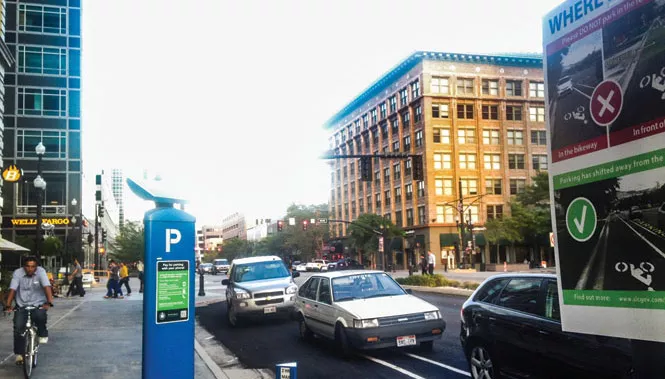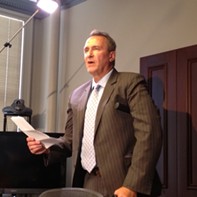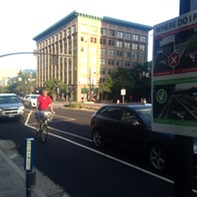Bikes Overriding Business
Downtown businesses angry over losing parking for new 300 South bicycle lanes
By Eric S. Peterson @ericspetersonThe surprise installation of new bike lanes on 300 South and losing the parking spots the lanes were painted over have left some downtown business owners feeling like Mayor Ralph Becker unfairly favors bikes over businesses in the city's core.
Chris Petrogeorge, owner of Pepper's Pita just west of Main Street on 300 South, says he was never asked for feedback on new bicycle lanes. The only notice he received was when the city told him that a new bike lane would remove multiple angled parking spaces from in front of his cafe.
"Parking is a premium downtown," Petrogeorge says. "We just lost three or four spaces on this side of the road and three or four on the other side of the road—and I still see more [bicyclists] riding on the road than down their bike lanes."
The majority of the new 300 South lanes, between 600 East and 300 West, are sandwiched between the curb on one side and parallel parking spaces on the other, with parked cars acting as a buffer between bikes and traffic. The lanes, part of Becker's ongoing mission to make the capital city more bike-friendly, are designed to make busy traffic areas safer for cyclists, but take up more space on the street.
Daniela Marroquin, owner of Garret Michael Barber Shop (435 E. 300 South), says she is not troubled by the lanes. While she lost a few spaces in front of her business, the street is now less cluttered, she says, making it safer to pull out of the business' driveway.
"I have quite a few clients that commute on bikes and they seem to love it," Marroquin says.
But the sentiment becomes more negative the closer to downtown the businesses are located.
Carmen von Bothmer, owner of City Creek Antiques (169 E. 300 South), which is located across from the Utah Department of Commerce, says people coming downtown to conduct government business often take street parking. She also loses spots to festival-goers every time a celebration is held at the nearby Washington Square.
"Parking is a real problem, and it's not very smart the city doing this without even letting us know," Von Bothmer says. Becker, she adds, "is not interested in us; he's only interested in his bike."
Art Raymond, spokesman for the mayor's office, says it's unfortunate that some business owners weren't part of the process of engagement for the new lanes, which began in 2011 and included public hearings and multiple door-to-door visits with businesses on the corridor, he says.
The project—which will cost $900,000 when completed—is one that Raymond says has been shown to help businesses in other cities by bringing in more bike-riding customers. But he says there will be a learning curve for all involved.
"I think our biggest challenge for this is that it's a paradigm shift," Raymond says.
David Dunn, owner of the TP Gallery on 252 S. Main, which has sold Native American arts and jewelry since 1975, worries that diminished parking will make it harder for businesses to receive not only customers but also deliveries.
"I understand people need to ride bikes, but when you're dealing with it in a way that's having such a negative effect on business, that means you want the business to leave," Dunn says.
Ben Raskin, a bartender at Keys on Main (242 S. Main) is also exasperated by the lanes, the confusing shapes left for cars to park in, and the fact the lanes may very well be useless during winter months.
"In December, we used to get free parking downtown," Raskin says. "Now we're losing spaces for bike lanes you can't use because there will be a foot and a half of snow on the ground, and that you need a master's degree in math to figure out how to park in."
Raskin says that if the city is serious about making downtown bicycle-friendly, it should follow the lead of Denver's popular 16th Street Mall, a vibrant outdoor shopping area that's closed to cars. The current in-between approach, he says, doesn't help anyone.
"Salt Lake City is a gem in the Intermountain West," Raskin says. "This is one of the greatest cities in America. If we're going to make downtown a part of that gem—the center stone in that engagement ring that stole my heart so many years ago—then let's get this goddamn parking thing figured out."
More by Eric S. Peterson
-
The Secret Sauce
How Utah lawmakers disclose—or don't disclose—conflicts of interest.
- Feb 14, 2024
-
Police departments in Salt Lake County spent almost $20 million on civil rights complaints in the past decade
The Co$t of Mi$conduct
- Oct 18, 2023
-
Women decry harassment and toxic culture at St. George auto dealership
Men at Work
- Oct 11, 2023
- More »
Latest in News
Readers also liked…
-
Raise a glass for E.L.T Harrison, architect of the Beerhive building on Main
Small Lake City
- Oct 11, 2023








